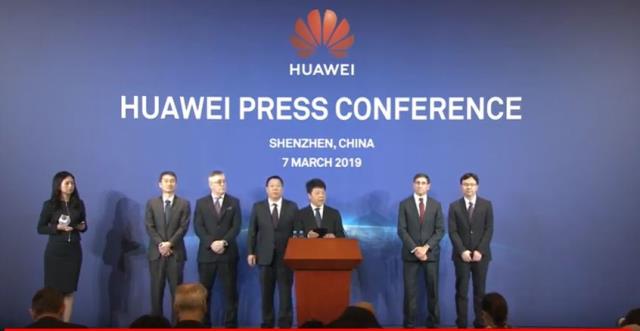Huawei Technologies, the number one telecom network maker, announced a lawsuit on Thursday against the United States.
 Huawei started making the announcement from its headquarters in Shenzhen, China, from 10:00 AM – 11:00 AM (GMT+8) on March 7, Thursday. A Reuters report said the lawsuit will be its response to an ongoing campaign managed by the United States.
Huawei started making the announcement from its headquarters in Shenzhen, China, from 10:00 AM – 11:00 AM (GMT+8) on March 7, Thursday. A Reuters report said the lawsuit will be its response to an ongoing campaign managed by the United States.
The US is saying China could be using Huawei’s telecoms equipment, which is powering a number of telecom networks in the world, for spying. Huawei founder Ren Zhengfei has earlier said Huawei has never and will never share data with China’s government.
Huawei deputy chairman Ken Hu earlier stressed on trust, collaboration, common standards during the opening of Huawei’s Cyber Security Transparency Center in Brussels.
The privately owned firm, which has revenues of $109 billion, has embarked on a public relations and legal offensive over the past two months as Washington lobbies allies to abandon Huawei when building 5G mobile networks, centering on a 2017 Chinese law requiring companies cooperate with national intelligence work.
Details
Huawei in an official statement said it filed a complaint in a US District Court in Plano, Texas that challenges the constitutionality of Section 889 of the 2019 National Defense Authorization Act (NDAA).
Huawei — through this action — seeks a declaratory judgment that the restrictions targeting Huawei are unconstitutional, and a permanent injunction against these restrictions.
“The U.S. Congress has repeatedly failed to produce any evidence to support its restrictions on Huawei products. We are compelled to take this legal action as a proper and last resort,” Guo Ping, Huawei Rotating Chairman said.
According to the complaint, Section 889 of the 2019 NDAA not only bars all U.S. Government agencies from buying Huawei equipment and services, but also bars them from contracting with or awarding grants or loans to third parties who buy Huawei equipment or services, without any executive or judicial process.
This violates the Bill of Attainder Clause and the Due Process Clause. It also violates the Separation-of-Powers principles enshrined in the U.S. Constitution, because Congress is both making the law, and attempting to adjudicate and execute it.
The NDAA restrictions prevent the company from providing more advanced 5G technologies to US consumers, which will delay the commercial application of 5G in the U.S. Beyond this, network users in rural and remote regions of the U.S. will be forced to choose between government funding and high-quality, cost-effective products. This will impede the network upgrade process.
Estimates show that allowing Huawei to compete would reduce the cost of wireless infrastructure by between 15 percent and 40 percent. This would save North America at least $20 billion over the next four years.
Guo Ping said Huawei is willing to address the U.S. Government’s security concerns. Lifting the NDAA ban will give the U.S. Government the flexibility it needs to work with Huawei and solve real security issues.





